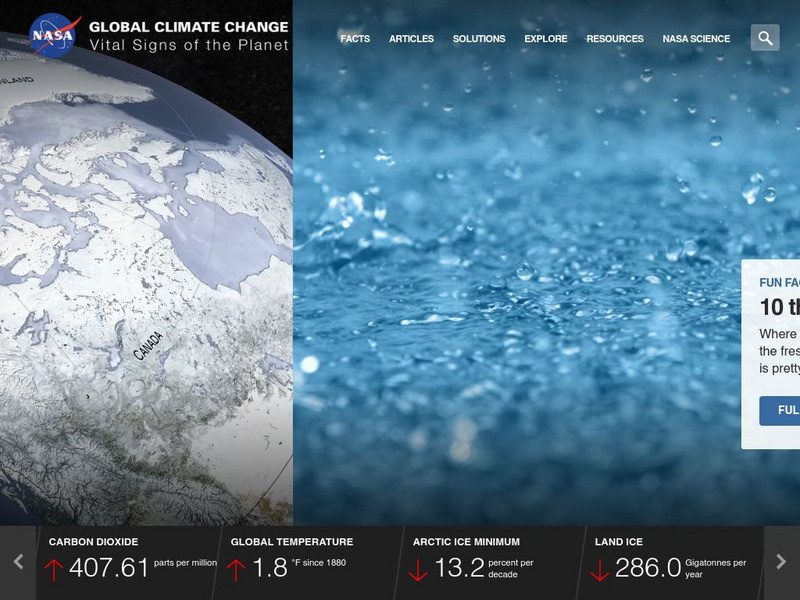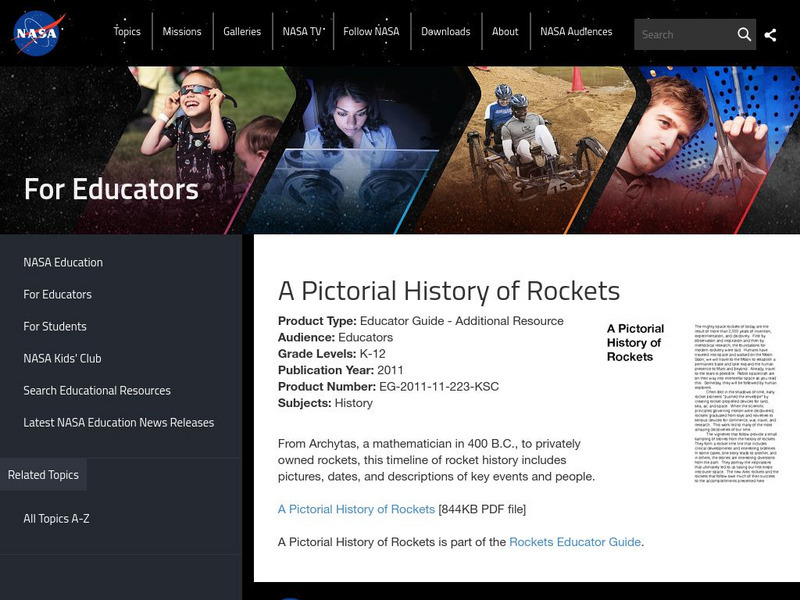NASA
Nasa: Cassini: Mission to Saturn
NASA site details what sets Saturn apart from the other planets in our solar system and why the Cassini spacecraft mission is important.
NASA
Nasa: Light but Strong
Use these lessons from NASA to teach multiple Next Generation Science Standards for grades K-5. Properties of matter and engineering design are the focus of these lessons. Detailed plans and student handouts are included. [PDF]
NASA
Nasa: Slr and Gps (And Plate Tectonics and Earthquakes) [Pdf]
This slideshow explains how satellites are used to measure the movement of tectonic plates.
NASA
Nasa: Mass vs. Weight
Several learning modules that explain the difference between mass and weight. Each module includes a video introduction and detailed lesson plan.
NASA
Nasa: Follow Curiosity's Descent to Mars
The Curiosity rover set out to answer the question: Did Mars ever have the right environmental conditions to support small life forms called microbes? The Curiosity Mars Descent Imager (MARDI) captured the rover's descent to the surface...
NASA
Nasa: Asteroids: Overview: Ancient Space Rubble
Comprehensive look at asteroids, with many useful facts, photos, and related links. Provides a detailed account of how asteroids get their names and a timeline of significant dates.
NASA
Nasa Jpl: Galileo Legacy Site
This site from NASA provides a detailed overview for the Galileo mission to Jupiter. Content ranges from the mission description to Jupiter images to educational resources.
NASA
Nasa: Mars Exploration Rover Mission: Animation
This series of animations will take you from Earth to the Red Planet in less than ten minutes. The animation series begins with the initial launch and journey through the Earth's atmosphere. Entry into Mars, its landing and exploration...
NASA
Nasa: Mars Science Laboratory: Curiosity Rover
Follow the Curiosity with this website that allows you see what is new, recent images and video, and ask questions to the mission control team.
NASA
Nasa Ames Research Center
The homepage of the Ames Research Center is located in Silicon Valley and is geared towards creating new knowledge and new technologies that span the spectrum of NASA interests. The resource also contains or has links to information on...
NASA
Nasa: Solar System
This resource provides a general overview of all the planets in the solar system, as well as the sun, various comets and asteroids, the deep space network, and the latest solar system news.
NASA
Nasa: Explorer: America's First Spacecraft
Featuring various multimedia resources, NASA provides a comprehensive overview of America's first space satellite, Explorer 1, that launched the United States into space exploration.
NASA
Nasa: Mars Exploration: Fun Zone: Mars for Kids
Find links to engaging games, activities, billion-pixel images and much more about Mars.
NASA
Nasa: Missions: Space Shuttle
Read a brief background about the NASA's space shuttle program and, then, dig deeper by watching videos, participating in interactive activities and reading additional information about the missions and the retirement of the shuttles.
NASA
Nasa: Global Climate Change
NASA keeps its eyes on the Earth in this dynamic site that stays with news about climate change. Includes facts, articles, interactive features, visualizations such as the Climate Time Machine, videos, and lots more.
NASA
Nasa: Diameter of the Moon: Grades 4 12
This lab activity allows students to calculate the diameter of the moon using proportions. Also follow links to other NASA lesson plans.
NASA
Nasa: Exploring the Moon Educator Guide
This NASA educator guide provides teachers with an outline for teaching a unit about the Moon. Find lessons and hands-on activities about the different parts of the Moon and lunar landing sites.
NASA
Nasa: Packing Up for the Moon Educator Guide
Use these lessons to help students understand more about the preparation it takes to go to the moon. Students will play an active part in decided what to take to the moon when given a specific objective. Includes PDF's (require Adobe...
NASA
Nasa: Optics: Light, Color, and Their Uses
Download this Educators Guide to light, color, and their uses. Choose from different activities using lenses, prisms, hidden messages, periscopes, and kaleidoscopes
NASA
Nasa: Our Solar System Lithograph Set
View a lithograph set that includes pictures and brief descriptions of planets, sun, asteroids, comets, meteors, and meteorites. While viewing the lithograph learn important dates and interesting facts about our solar system.
NASA
Nasa: Rockets Educator Guide: How Rockets Work
In this article, learn how rockets work. Discover Newton's Law of Motion and learn how it supports rocketry.
NASA
Nasa: Rockets Educator Guide: A Pictorial History
View pictures, descriptions, and dates of rockets throughout history. Learn about rockets and how they have evolved throughout time.
NASA
Nasa: Rockets Educator Guide: Heavy Lifting
A lesson plan for students to construct balloon powered rockets. Students will be given the same materials to construct their own rocket and then have a contest to see who can launch the highest paperclip from their rocket.
NASA
Nasa: Glenn Research Center Homepage
NASA's Glenn Research Center "develops advanced technology for high priority national needs - propulsion, power, and communications technologies for application to aeronautics and space."









